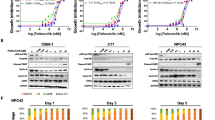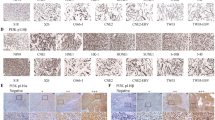Summary
Phosphorylated (pi-) protein kinase B (AKT) is commonly expressed in nasopharyngeal carcinoma (NPC) cell lines and tissues, suggesting the involvement of AKT-mammalian target of rapamycin (mTOR) signaling in NPC carcinogenesis. This study evaluated the activity of an mTOR inhibitor, RAD001 (Everolimus, Novartis Pharma AG, Switzerland), in 5 NPC cell lines (HK1, HONE-1, CNE-1, CNE-2, C666-1), 2 cisplatin-resistant NPC cell lines and their respective parental cell lines (HK1-LMP1, HONE-1-EBV). RAD001 inhibited cell growth in a dose-dependent manner at nanomolar concentrations in all cell lines. HONE-1 was most sensitive to RAD001 (IC50 = 0.63 nM, 60% maximal inhibition), while Het-1A (a normal esophageal epithelial cell line) was relatively resistant. No consistent relationship between sensitivity to RAD001 and basal expression of pi-mTOR and pi-p70S6 Kinase-1 (p70S6K) was found. Exposure to RAD001 at picomolar concentrations for 48 h resulted in reduction of pi-mTOR and pi-p70S6K1 expression, but increase in pi-AKT (Ser473) expression in HONE-1 and CNE-1 cell lines. RAD001 significantly induced apoptosis in HONE-1 cells, but has no effect on cell cycle progression. RAD001 exerted an additive to synergistic effect on cisplatin-induced growth inhibition in CNE-1 and HONE-1 cells, and could inhibit the growth of both cisplatin-resistant and cisplatin-sensitive NPC cell lines. In summary, combination of RAD001 and cisplatin maybe a useful therapeutic strategy in NPC. AKT upregulation following RAD001 treatment suggests the presence of a feedback loop on AKT signaling in NPC which warrants further investigation.





Similar content being viewed by others
References
Ma BB, Hui EP, Chan AT (2008) Systemic approach to improving treatment outcome in nasopharyngeal carcinoma: current and future directions. Cancer Sci 99(7):1311–1318. doi:10.1111/j.1349-7006.2008.00836.x
Ma BB, Chan AT (2006) Systemic treatment strategies and therapeutic monitoring for advanced nasopharyngeal carcinoma. Expert Rev Anticancer Ther 6(3):383–394. doi:10.1586/14737140.6.3.383
Liu LZ, Qian G, Shi X, Fang J, Jiang BH (2007) AKT1 amplification regulates cisplatin resistance in human lung cancer cells through the mammalian target of rapamycin/p70S6K1 pathway. Cancer Res 67(13):6325–6332. doi:10.1158/0008-5472.CAN-06-4261
Yip WK, Leong VC, Abdullah MA, Yusoff S, Seow HF (2008) Overexpression of phospho-Akt correlates with phosphorylation of EGF receptor, FKHR and BAD in nasopharyngeal carcinoma. Oncol Rep 19(2):319–328
Morrison JA, Pathmanathan R, Raab-Traub N (2004) Differential signaling pathways are activated in the Epstein-Barr virus-associated malignancies nasopharyngeal carcinoma and Hodgkin lymphoma. Cancer Res 64(15):5251–5260. doi:10.1158/0008-5472.CAN-04-0538
Mei YP, Zhou JM, Wang Y, Huang H, Deng R, Feng GK, Zeng YX, Zhu XF (2007) Silencing of LMP1 induces cell cycle arrest and enhances chemosensitivity through inhibition of AKT signaling pathway in EBV-positive nasopharyngeal carcinoma cells. Cell Cycle 6(11):1379–1385
Zhang X, Wang Q, Ling MT, Wong YC, Leung SC, Wang X (2007) Anti-apoptotic role of TWIST and its association with Akt pathway in mediating taxol resistance in nasopharyngeal carcinoma cells. Int J Cancer 120(9):1891–1898. doi:10.1002/ijc.22489
Wangpaichitr M, You M, Kuo MT, Feun L, Lampidis T, Savaraj N (2008) Inhibition of mTOR restores cisplatin sensitivity through down-regulation of growth and anti-apoptotic proteins. Eur J Pharmacol 591(1–3):124–127. doi:10.1016/j.ejphar.2008.06.028
Mabuchi S, Altomare DA, Cheung M, Zhang L, Poulikakos PI, Hensley HH, Schilder RJ, Ozols RF, Testa JR (2007) RAD001 inhibits human ovarian cancer cell proliferation, enhances cisplatin-induced apoptosis, and prolongs survival in an ovarian cancer model. Clin Cancer Res 13(14):4261–4270. doi:10.1158/1078-0432.CCR-06-2770
Beuvink I, Fumagalli S, Zilbermann F, Ruetz S, O’Reilly T, Natt F, Hall J, Lane HA, Thomas G (2005) The mTOR inhibitor RAD001 sensitizes tumor cells to DNA-damaged induced apoptosis through inhibition of p21 translation. Cell 120(6):747–759. doi:10.1016/j.cell.2004.12.040
Tamburini J, Chapuis N, Bardet V, Park S, Sujobert P, Willems L, Ifrah N, Dreyfus F, Mayeux P, Lacombe C, Bouscary D (2008) Mammalian target of rapamycin (mTOR) inhibition activates phosphatidylinositol 3-kinase/Akt by up-regulating insulin-like growth factor-1 receptor signaling in acute myeloid leukemia: rationale for therapeutic inhibition of both pathways. Blood 111(1):379–382. doi:10.1182/blood-2007-03-080796
Mabuchi S, Altomare DA, Connolly DC, Klein-Szanto A, Litwin S, Hoelzle MK, Hensley HH, Hamilton TC, Testa JR (2007) RAD001 (Everolimus) delays tumor onset and progression in a transgenic mouse model of ovarian cancer. Cancer Res 67(6):2408–2413. doi:10.1158/0008-5472.CAN-06-4490
O’Reilly KE, She QB, Solit D, Mills GB, Smith D, Lane H, Hofmann F, Hicklin DJ, Ludwig DL, Baselga J, Rosen N (2006) mTOR inhibition induces upstream receptor tyrosine kinase signaling and activates Akt. Cancer Res 66(3):1500–1508. doi:10.1158/0008-5472.CAN-05-2925
Motzer RJ, Escudier B, Oudard S, Hutson TE, Porta C, Bracarda S, Grunwald V, Thompson JA, Figlin RA, Hollaender N, Urbanowitz G, Berg WJ, Kay A, Lebwohl D, Ravaud A (2008) Efficacy of everolimus in advanced renal cell carcinoma: a double-blind, randomised, placebo-controlled phase III trial. Lancet 372(9637):449–456. doi:10.1016/S0140-6736(08)61039-9
Cao C, Subhawong T, Albert JM, Kim KW, Geng L, Sekhar KR, Gi YJ, Lu B (2006) Inhibition of mammalian target of rapamycin or apoptotic pathway induces autophagy and radiosensitizes PTEN null prostate cancer cells. Cancer Res 66(20):10040–10047. doi:10.1158/0008-5472.CAN-06-0802
Albert JM, Cao C, Lu B (2006) Targeting the Akt/mammalian target of rapamycin pathway for radiosensitization of breast cancer. Mol Cancer Ther 5(5):1183–1189. doi:10.1158/1535-7163.MCT-05-0400
Wanner K, Hipp S, Oelsner M, Ringshausen I, Bogner C, Peschel C, Decker T (2006) Mammalian target of rapamycin inhibition induces cell cycle arrest in diffuse large B cell lymphoma (DLBCL) cells and sensitises DLBCL cells to rituximab. Br J Haematol 134(5):475–484. doi:10.1111/j.1365-2141.2006.06210.x
Haritunians T, Mori A, O’Kelly J, Luong QT, Giles FJ, Koeffler HP (2007) Antiproliferative activity of RAD001 (everolimus) as a single agent and combined with other agents in mantle cell lymphoma. Leukemia 21(2):333–339. doi:10.1038/sj.leu.2404471
Wan X, Shen N, Grohar P, Helman LJ (2007) Rapamycin induces feedback activation of Akt signaling through an IGF-1R-dependent mechanism. Oncogene 26(13):1932–1940. doi:10.1038/sj.onc.1209990
Acknowledgement
This study was supported in part by Li Ka Shing Institute for the Health Science, Chinese University of Hong Kong. Reprint requests should be sent to the corresponding author. The authors declare no conflict of interest with this manuscript. Result of this study was presented in part at the Annual Meeting of the American Association of Cancer Research, San Diego, CA, 2008. We thank Dr S. Hardikar and Novartis Pharmaceuticals Corporation for providing RAD001 in this study.
Author information
Authors and Affiliations
Corresponding author
Additional information
Brigette B. Y. Ma and Vivian W. Y. Lui joint 1st authors.
Electronic supplementary material
Below is the link to the electronic supplementary material.
ESM 1
Supplementary Figures to Figure 2b (PPT 9.86 MB)
Rights and permissions
About this article
Cite this article
Ma, B.B.Y., Lui, V.W.Y., Hui, E.P. et al. The activity of mTOR inhibitor RAD001 (everolimus) in nasopharyngeal carcinoma and cisplatin-resistant cell lines. Invest New Drugs 28, 413–420 (2010). https://doi.org/10.1007/s10637-009-9269-x
Received:
Accepted:
Published:
Issue Date:
DOI: https://doi.org/10.1007/s10637-009-9269-x




